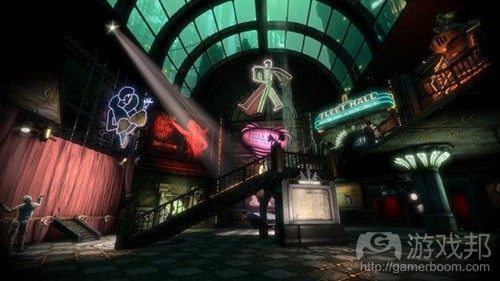Christopher Kline关于《生化奇兵》开发的记忆
作者:Bryant Francis
今天我收集了来自2K Marin的《生化奇兵2》前开发者的一些记忆。这是关于创造出像《到家》,《小说家》等世界知名游戏的开发过程的深刻洞悉,但是当我们去寻找《生化奇兵》的相关记忆时,我们并不只是想摸索有关其续集的信息。
让我们看看前首席程序员Christopher Kline所意识到的《生化奇兵》能够获得成功的一些时刻以及一些仍然影响着他今天的创作的编程方面的经验教训。
1.关于《生化奇兵》系列的创造最让你印象深刻的记忆是什么?
在《生化奇兵》非常早期阶段,我曾与设计师Dorian Hart关于他提议添加到游戏设计中的特殊功能展开讨论。因为意识到这一功能存在一些技术问题,我便告诉他我认为不该去执行该功能。而到现在我还是忘不了接下来发生的事,因为那真的让我大吃一惊。因为比起反驳我,Dorian是这么对我说的:“我之所以希望将其添加到设计中是因为我们希望玩家能够在X和Y之间做出艰难的决定,因为他们能够因此感受到Z。这能够帮助我找到一些足以帮助我们实现目标的可行技术方式。”这一简单的对话让我意识到游戏设计其实就像一门“学科,如果想要成为一名优秀的设计师你就必须成为一名学者,并能够深入且严肃考虑自己的创作。
我的另一个深刻记忆便是第一次真正“玩”《生化奇兵》关卡的那个晚上。那种感觉很奇怪,但作为一名程序员我真的很少在开发期间愉快地玩游戏。通常情况下我都非常忙碌,所以为了修改漏洞我会尝试着进入游戏中并使用作弊码尽快到达我需要修改的地方。而另一个原因是我不希望破坏自己作为玩家的体验—-我希望在游戏发行时自己能够拥有和其他玩家一样的“新鲜感”。实际上对于《生化奇兵:无限》,我在游戏发行前甚至不清楚游戏最终的结局是怎样的!
在最初的《生化奇兵》的开发过程中,我记得有天晚上我在办公室待到非常晚,并且我认为其他人应该都回家了。大概在午夜时分我们的设计师Jordan Thomas突然进入我的办公室并问我是否想试试他正在创造的内容,也就是Fort Frolic关卡。他并不跟我多做解释只是让我去玩看看。而在那之前我只尝试过自己所开发或调试的一些独立系统(游戏邦注:它们并没有任何故事背景或连续性)。
而在尝试游戏的过程中我发现我们的编程团队始终致力于将所有内容有效整合在一起,并且我们优秀的设计师使用了一系列技术系统创造出了让人惊艳且真正吸引人的情感体验。我是一个速度较慢的玩家,所以大概在凌晨2,3点的时候才完成游戏,而这期间Jordan一直在旁边做记录并鼓励我。
我对这款游戏的出色程度感到惊讶,这是我永远都不会忘记的时刻。这也是作为游戏开发者的我们的努力得到回报的时刻。
2.你认为哪些经验教训继续影响着你的职业生涯?
在过去我所学到的一个最重要的经验教训便是理念是廉价的,进程是复杂的。如果你不能使用一个真正具有说服力的论据去支持自己的理念,你便只是在浪费大家的时间。我很幸运能够待在一支所有人都各有所长(不管是在美术,设计或编程领域),同时他们也愿意通过努力去验证自己想法的团队中。他们都非常欢迎人们去客观评价自己的工作,并且也能坦然接受所有批评。
3.你是否认为开发者可以从《生化奇兵》游戏中学到什么?
从我的角度来说,我只是一个运气不错能够和一群比我有才的人共事的程序员,所以我认为自己没有权利去阐述其他人可以从我们的游戏中学到什么。但我希望所有《生化奇兵》的全新游戏流程能够为那些想要创造或重塑自己游戏的开发者提供全新细节,理念与帮助。
(本文为游戏邦/gamerboom.com编译,拒绝任何不保留版权的转发,如需转载请联系:游戏邦)
Quick memories of BioShock development from lead programmer Christopher Kline
by Bryant Francis
Today we collected some memories of the development of BioShock 2 from former developers at 2K Marin. It’s an insightful look into a development process that would eventually give the world games like Gone Home, The Novelist, and more, but when we went out looking for BioShock memories we weren’t just looking for thoughts from the sequel.
As it happened, we were able to have Bill Gardner join us for an excellent look at BioShock’s first hour last week, and former lead programmer Christopher Kline wasn’t able to join us due to a scheduling conflict. But Kline was able to take a moment to share his memories working on the original game, and was kind enough to share them with us via e-mail.
Read on for some of Kline’s thoughts about the moment he realized BioShock would work, and some of the programming lessons that still influence his career today.
1. What are some of your strongest memories working on the BioShock series?
Very early on in the history of BioShock I was talking with designer Dorian Hart on a particular feature that he had proposed adding to the game design. Realizing that it would be quite problematic for a number of technical reasons, I told him that I didn’t think we would be able to implement it. I distinctly remember what happened next, because it caught me by surprise. Instead of fighting me on it, Dorian said to me something to the effect of “Ok, well the reason I added it to the design is because we want the player to be forced to make difficult decisions between X and Y, so that she *feels* Z. Help me figure out some other technically feasible way we can achieve that goal.” This simple conversation made me realize that game design is a *discipline*, and that to be a great designer you must be a scholar, capable of thinking deeply and critically about your craft.
Another of my strongest memories was the night I first actually *played* a BioShock level. It may seem strange, but as a programmer I very rarely played the game for enjoyment during development. Often I was just too busy, so to fix bugs I’d try to jump in and use cheat codes to get as quickly as possible to the situation I needed to fix. But another motivation was a desire not to spoil the experience for myself as a gamer — I wanted to play it “fresh” when it was released, just like everyone else. In fact, on BioShock Infinite I didn’t even know the ending of the game until I played it after release!
Anyhow, during the development of the original BioShock I remember being in the office very late one night when I thought everyone had already gone home. Around midnight the designer Jordan Thomas came popped his head into the room and asked if I wanted to try out something he was working on, which happened to be the Fort Frolic level. Refusing to tell me anything, he just asked me to play the game. Now, up until that point I had only experienced our game as a series of disconnected systems I was either developing or debugging, devoid of any narrative context or continuity.
In that eye-opening play-through I finally saw how everything the programming team had been working on fit together, how our brilliant designers could take a bag of technical systems and use them to create an amazing, engaging and emotional experience. I’m a slow player, so I didn’t finish until around 2 or 3 AM, but Jordan stayed there the entire time taking notes and encouraging me on.
The camaraderie we shared, and my excitement at realizing how good this game could turn out to be, is something I’ll never forget. Those are the kind of payoff moments you live for as a game developer.
2. What do you think are some of the biggest lessons you learned that affected your professional career?
The single more important lesson I’ve learned over time is that ideas are cheap and progress is hard. If you can’t you back up your idea with a convincing argument that you’re personally willing to develop into a working demonstration, you’re just wasting everyone’s time. I was very fortunate to be on a team of people who were not only immensely talented in their particular field — be it art, design, or programming — but willing to champion their ideas through relentless personal effort. The most successful of these people also welcomed and even solicited harsh criticism of their work, and were able to accept that criticism with grace.
3. What do you feel developers can learn from revisiting the BioShock games?
From my perspective, I was just a programmer who had the good fortune to work in service of people far more talented than me, so I’m uncomfortable stating with any authority what others should learn from our games. But my hope is that every new play-through of BioShock reveals new details, ideas, and flourishes that developers can take, re-shape and re-use to great success in their own games. (source:gamasutra)
上一篇:在电子游戏中创造实时故事
下一篇:单人游戏中的不同级别情感表现








































 闽公网安备35020302001549号
闽公网安备35020302001549号